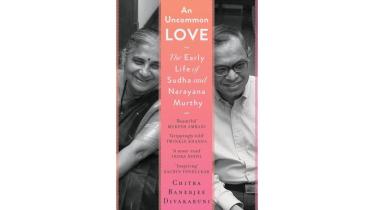From Palace of Illusions, a fictional retelling of Mahabharata from Draupadi’s perspective, and The Forest of Enchantments, on Ramayana with Sita as the protagonist, to The Last Queen with Maharani Jindan Kaur as its heroine, writer Chitra Banerjee Divakaruni is known to tell women stories with fiction as the medium. So when she came out with An Uncommon Love: The Early Life of Sudha and Narayana Murthy, having delved into non-fiction for the first time, it was ‘an actor trying to break her image’ kind of experience for her. On the sidelines of the five-day Jaipur Literature Festival (JLF), the Indian-American author spoke with Shubhangi Shah about writing non-fiction for the first time, and what is it about mythological and historical fiction that she keeps revisiting.
Your body of work before An Uncommon Love: The Early Life of Sudha and Narayana Murthy comprised only fiction. How was the experience of delving into non-fiction for the first time?
At first, I was quite hesitant, as this was something I had not done before. But Chiki Sarkar of Juggernaut talked me into considering it. As I researched the subject matter, I got excited as I felt these largely unknown stories about the Murthys’ early life had a lot to inspire and encourage readers and touch their hearts.
The book reads more like a biography of their relationship than people. Is it challenging to bring about emotions in the genre of non-fiction? Did your work in fiction come in handy here?
It was challenging to understand the emotions underlying particular incidents and then to show them dramatically. So yes, my earlier work in writing fiction helped as I could deal with the scenes I was writing just as I would when writing a book such as Palace of Illusions (with Draupadi) or The Forest of Enchantments (with Sita), where I was interpreting scenes that were already given to me through the Mahabharata and Ramayana and trying to express my heroines’ feelings.
Speaking of fiction, you have an extensive body of work delving into mythological and historical fiction, where strong and flawed women are at the centre. What is it about this theme that you keep revisiting?
I feel it is important to showcase strong, complex, and flawed women and not give in to societal pressure to whitewash heroines and pretend that only perfect women should be admired and emulated. That is why such characters occur in my works over and over.
Yes, I got totally immersed in the characters and felt their feelings. For instance, when Sudha had to leave her first baby, Akshata, with her parents because of work pressure and the absence of trustworthy child care, I felt her sorrow, guilt and heartbreak—and I put it all down on the page.
While writing about mythological figures, you bring forth the flaws and strengths of the characters. There can also be much glorification of the same. How do you think this theme should be written about since the topic has the potential to stoke emotions?
It is important for literature to present us with heroes and admirable characters who are also complex and human. That way we can relate to them and learn from them. If we use mythological figures for propaganda, in my mind that is a sad misuse of their potential.
We are witnessing a rise in religious majoritarianism. Do you think books are also becoming a medium to further that?
Books have been misused, down the ages, in many ways, sometimes to create propaganda, sometimes to garner hatred. So, it would not be a new thing to have this happen now. My hope is that both writers and readers will recognise the immense power of words and use them for their best purposes, which is to examine our times and uphold our common humanity. Readers can influence this to a great extent by only buying such books.
